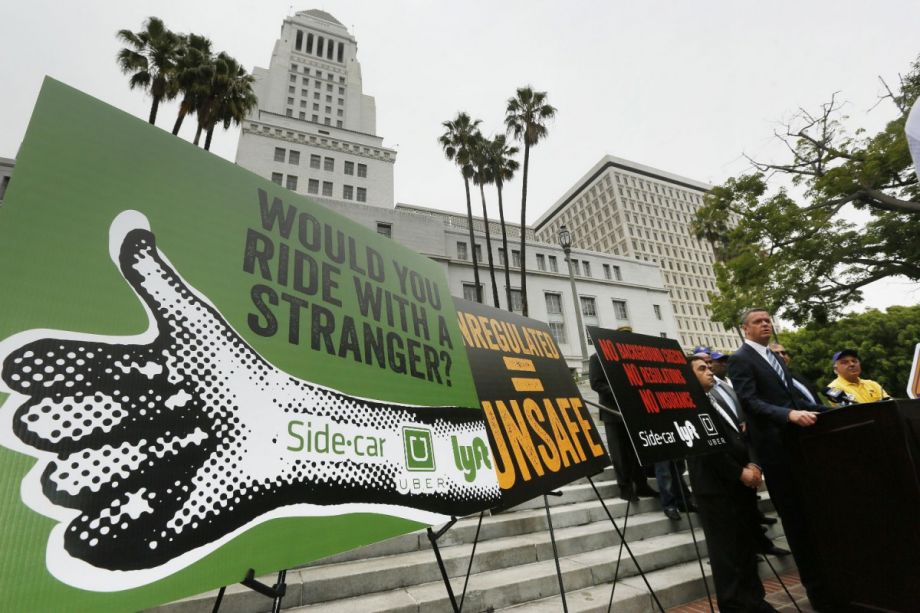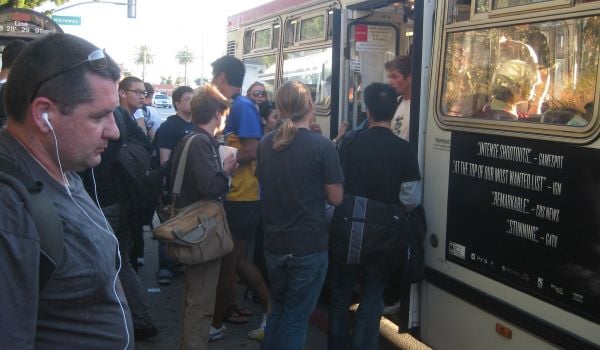A Chicago woman filed a suit against ride-on-demand company Uber on Wednesday, claiming that earlier this month a 31-year-old driver for the UberX service hit on her, groped her and refused to let her out of his car. She is suing the driver, too. The local CBS News affiliate reports on what the passenger says happened after the driver allegedly asked her to move to the front seat to help him navigate:
He asked her to dinner while touching her leg, but when she refused, the driver slowed down and meandered through residential side streets, asking for her phone number and asking why she would not go out with him, the suit claims.The driver repeatedly stopped the car while fondling the woman’s legs, groin and breasts, the suit claims. He also kept telling the woman they would have sex and were going to dinner together, the suit said.
The suit alleges the driver would not unlock the car doors or stop to let her out of the car. The woman claims she tried to get out on her own several times, but that each time the driver would start the car moving again.
Uber has had a rough March. The Seattle City Council’s decision last week to cap the number of ride share drivers at 450 — distributed between UberX, Lyft and Sidecar — is a direct threat to a business model that seems to require a certain flexibility about matching drivers and rides on the fly. Meanwhile, there are complaints that Uber’s new insurance scheme for UberX drivers requires that they check with their personal insurance first, raising worries about everything from getting drivers kicked off their policies to insurance fraud.
(Recall that UberX is the flavor of Uber where ‘amateur’ drivers provide rides in their own cars. That’s distinct from the varieties of Uber where an app connects riders with preexisting black car and taxi drivers. Uber began operations in 2010. Lyft and Sidecar in 2012. UberX rolled out in the spring of 2013, citing “massive regulatory ambiguity leading to one-sided competition which Uber has not engaged in to its own disadvantage.”)
Assaults by UberX drivers, of course, have more serious implications for everyone involved. They’re also probably inevitable. In perhaps the highest-profile case, a San Francisco man last November said that after squabbling over directions, an UberX driver verbally berated him using homophobic and ethnic slurs. In that instance, the company first suspended the driver and, some time later, blocked him completely from working with UberX.
In-cab violence has long been part and parcel of the industry, however, and was in fact one of the strongest arguments for first heavily regulating taxis in New York City in the early 20th century. (Oftentimes it’s drivers who are attacked, something that Uber hasn’t had to deal with yet.) But UberX falls outside those existing regulations, and Uber has tried preempt having new rules forced upon it.
After last November’s incident, Uber wrote that “Our highest priority is connecting our users to the safest, most reliable transportation providers — and on the rare occasion that an incident between a Uber partner and passenger leads to action by law enforcement, we are cooperative with the investigation.” It pointed to the fact that UberX drivers pass a background check conducted by the firm Hirease. Tech publication PandoDaily, though, found out that the driver in that case had felony convictions for selling marijuana and cocaine. Uber later moved to what it presented as a more rigorous background check for UberX, stating that “all new ride sharing drivers in all American markets will undergo federal and county background checks, on top of the existing Multi-State Criminal Database check.”
That cycle of negotiation — incidents occur, Uber adjusts — will likely roll on. It’s happening elsewhere in the “sharing economy” world. Just this weekend, Airbnb reacted quickly when a New York man discovered that those who rented his apartment were using it for a “panty raid party.” Within a day, the company changed his locks, put him up in a hotel, and wired over some $24,000 to cover damages and, presumably, cleaning supplies. Airbnb got huzzahs for what Fast Company branded the company’s “freakishly rapid” response.
When it comes to Uber, it seems like the big question will be whether complying with the same sort of demands will stop making it worthwhile to be in the ride share business at all. In other words, can UberX continue to flourish when it faces many of the same burdens that have been put on cabbies for years? (And perhaps some additional ones, too?) Or does the ride share model crack under that weight?

Nancy Scola is a Washington, DC-based journalist whose work tends to focus on the intersections of technology, politics, and public policy. Shortly after returning from Havana she started as a tech reporter at POLITICO.
















